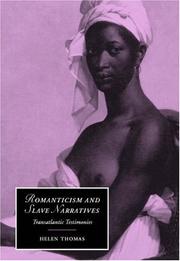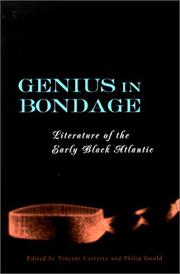| Listing 1 - 3 of 3 |
Sort by
|

ISBN: 1107118514 128334212X 9786613342126 1139159763 1139155202 0511048963 051115108X 0511010583 9780511010583 0521662346 9780521662345 0511033729 9780511033728 9780511151088 9781139155205 9781107118515 6613342122 9781139159760 9780511048968 9780521604567 Year: 2000 Publisher: Cambridge [England] New York Cambridge University Press
Abstract | Keywords | Export | Availability | Bookmark
 Loading...
Loading...Choose an application
- Reference Manager
- EndNote
- RefWorks (Direct export to RefWorks)
The first major attempt to relate canonical Romantic texts to the African diaspora, this study explores connections with literature produced by slaves, slave owners, abolitionists and radical dissenters between 1770 and 1830. Thomas reveals a dialogue between two diverse cultural spheres, and their corresponding systems of thought, epistemology and expression.
English literature --- Slavery in literature. --- American literature --- Slaves' writings, American --- Slaves' writings, English --- Antislavery movements --- African Americans in literature. --- Slave trade in literature. --- Romanticism. --- Pseudo-romanticism --- Romanticism in literature --- Aesthetics --- Fiction --- Literary movements --- Afro-Americans in literature --- Negroes in literature --- Abolitionism --- Anti-slavery movements --- Slavery --- Human rights movements --- English slaves' writings --- American slaves' writings --- Slavery and slaves in literature --- Slaves in literature --- History and criticism. --- African American authors --- Black authors --- History. --- African Americans in literature --- Romanticism --- Slavery in literature --- Slaves --- Slave trade in literature --- Enslaved persons --- Persons --- British literature --- Inklings (Group of writers) --- Nonsense Club (Group of writers) --- Order of the Fancy (Group of writers) --- Agrarians (Group of writers) --- African American authors&delete& --- History and criticism --- History --- Black authors&delete& --- Intellectual life --- Thematology --- anno 1700-1799 --- anno 1800-1899 --- 18th century --- Authors [Black ] --- 19th century --- Slaves' writings [American ] --- Slaves' writings [English ] --- English enslaved persons' writings --- American enslaved persons' writings --- Enslaved persons in literature --- Enslaved persons' writings, American --- Enslaved persons' writings, English

ISBN: 0813159466 9780813159461 1322597324 9781322597324 0813122031 9780813122038 Year: 2015 Publisher: Lexington The University Press of Kentucky
Abstract | Keywords | Export | Availability | Bookmark
 Loading...
Loading...Choose an application
- Reference Manager
- EndNote
- RefWorks (Direct export to RefWorks)
Until fairly recently, critical studies and anthologies of African American literature generally began with the 1830s and 1840s. Yet there was an active and lively transatlantic black literary tradition as early as the 1760s. Genius in Bondage situates this literature in its own historical terms, rather than treating it as a sort of prologue to later African American writings. The contributors address the shifting meanings of race and gender during this period, explore how black identity was cultivated within a capitalist economy, discuss the impact of Christian religion and the Enlightenment
Blacks in literature. --- Slavery in literature. --- Africans --- Slaves' writings, English --- English literature --- African literature (English) --- Negroes in literature --- Slavery and slaves in literature --- Slaves in literature --- Ethnology --- English slaves' writings --- Historiography. --- History and criticism. --- Black authors --- Sancho, Ignatius, --- Wheatley, Phillis, --- Hammon, Briton. --- Equiano, Olaudah, --- Sancho, Charles Ignatius, --- Peters, Phillis Wheatley, --- Peters, Phillis, --- Wheatley, Phyllis, --- Criticism and interpretation. --- English-speaking countries --- Anglophone countries --- Countries, Anglophone --- Countries, English-speaking --- Intellectual life --- African literature (English). --- Aufsatzsammlung. --- English literature. --- Intellectual life. --- Literatur. --- Schwarze. --- Sklaverei --- Slaves' writings, English. --- Historiography --- Black authors. --- History and criticism --- Interesting narrative of the life of Olaudah Equiano (Equiano, Olaudah). --- 1700-1799. --- Geschichte 1760-1880. --- Atlantischer Raum. --- English-speaking countries. --- USA. --- Blacks in literature --- Black people in literature. --- English enslaved persons' writings --- Enslaved persons in literature --- Enslaved persons' writings, English
Book
ISBN: 0813938252 9780813937984 0813937981 9780813938257 9780813937991 081393799X Year: 2016 Publisher: Charlottesville
Abstract | Keywords | Export | Availability | Bookmark
 Loading...
Loading...Choose an application
- Reference Manager
- EndNote
- RefWorks (Direct export to RefWorks)
"In an interdisciplinary approach to black antislavery literatures at the dawn of the nineteenth century, Stefan Wheelock shows how the political character of freedom and a religious sensibility allowed Black antislavery writers to countermand ideologies of white supremacy while fostering a sense of racial community and identity. The major figures he selects--Ottobah Cugoano, Olaudah Equiano, David Walker, and Maria Stewart--were principally concerned with ending racial slavery and the slave trade, but they employed antislavery rhetoric at a time when the institution of slavery was preparing progressive Western politics to enter a new phase of imperial and racial domination. This contradictory circumstance, Wheelock argues, poses a significant challenge for understanding the development of this watershed moment in Western political identity. The author looks at the ways in which, during this period, religious and secular versions of collective political destiny both competed and cooperated to forge a vision for a more perfect and just society. What especially captures his interest is how the writers of the African Atlantic deployed religious sensibilities and the call for emancipation as a way of characterizing the liberal foundations of Atlantic political modernity. Although neither "modernity" nor "progress" is a term these writers used, Wheelock contends that a concern with modernity and its liberal character is implicit in their critiques and/or portrayals of the advanced political structures that gave rise to racial enslavement in the first place" --
American literature --- Slaves' writings, English --- Slavery --- Slavery in literature. --- English literature --- Slavery and slaves in literature --- Slaves in literature --- Abolition of slavery --- Antislavery --- Enslavement --- Mui tsai --- Ownership of slaves --- Servitude --- Slave keeping --- Slave system --- Slaveholding --- Thralldom --- Crimes against humanity --- Serfdom --- Slaveholders --- Slaves --- English slaves' writings --- African American authors --- History and criticism. --- Political aspects. --- Religious aspects. --- History and criticism --- Stewart, Maria W., --- Walker, David, --- Equiano, Olaudah, --- Cugoano, Ottobah. --- Slavery in literature --- Religious aspects --- Enslaved persons in literature --- Enslaved persons --- English enslaved persons' writings --- Enslaved persons' writings, English
| Listing 1 - 3 of 3 |
Sort by
|

 Search
Search Feedback
Feedback About UniCat
About UniCat  Help
Help News
News